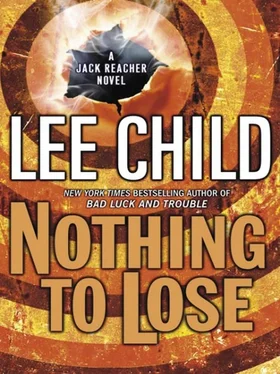Together they made a warm low smudge in the haze. Ahead of him to the west were tens of thousands of flat square miles, completely empty except for ribbons of distant roads and the town of Despair about eight or nine miles ahead. Despair was harder to see than Hope. The haze was thicker in the west. The place looked larger than Hope had been, and teardrop-shaped, with a conventional plains downtown mostly south of the main drag and then a wider zone of activity beyond it, maybe industrial in nature, hence the smog. Despair looked less pleasant than Hope. Cold, where Hope had looked warm; gray, where Hope had been mellow. It looked unwelcoming. For a brief moment Reacher considered backtracking and striking out south from Hope itself, getting back on course, but he dismissed the thought even before it had fully formed. Reacher hated turning back. He liked to press on, dead ahead, whatever. Everyone’s life needed an organizing principle, and relentless forward motion was Reacher’s.
He was angry at himself later, for being so inflexible.
He climbed off the rock and rejoined the road twenty yards west of where he had left it. He stepped up onto the left-hand edge and continued walking, long strides, an easy pace, a little faster than three miles an hour, facing oncoming traffic, the safest way. But there was no oncoming traffic. No traffic in either direction. The road was deserted. No vehicles were using it. No cars, no trucks. Nothing. No chance of a ride. Reacher was a little puzzled, but mostly unconcerned. Many times in his life he had walked a lot more than seventeen miles at a stretch. He raked the hair off his forehead and pulled his shirt loose on his shoulders and kept on going, toward whatever lay ahead.
Despair’s downtown area began with a vacant lot where something had been planned maybe twenty years before but never built. Then came an old motor court, shuttered, maybe permanently abandoned. Across the street and fifty yards west was a gas station. Two pumps, both of them old. Not the kind of upright rural antiques Reacher had seen in Edward Hopper’s paintings, but still a couple of generations off the pace. There was a small hut in back with a grimy window full of quarts of oil arrayed in a pyramid. Reacher crossed the apron and stuck his head in the door. It was dark inside the hut and the air smelled of creosote and hot raw wood. There was a guy behind a counter, in worn blue overalls stained black with dirt. He was about thirty, and lean.
“Got coffee?” Reacher asked him.
“This is a gas station,” the guy said.
“Gas stations sell coffee,” Reacher said. “And water, and soda.”
“Not this one,” the guy said. “We sell gas.”
“And oil.”
“If you want it.”
“Is there a coffee shop in town?”
“There’s a restaurant.”
“Just one?”
“One is all we need.”
Reacher ducked back out to the daylight and kept on walking. A hundred yards farther west the road grew sidewalks and according to a sign on a pole changed its name to Main Street. Thirty feet later came the first developed block. It was occupied by a dour brick cube, three stories high, on the left side of the street, to the south. It might once have been a dry goods emporium. It was still some kind of a retail enterprise. Reacher could see three customers and bolts of cloth and plastic household items through its dusty ground-floor windows. Next to it was an identical three-story brick cube, and then another, and another. The downtown area seemed to be about twelve blocks square, bulked mostly to the south of Main Street. Reacher was no kind of an architectural expert, and he knew he was way west of the Mississippi, but the whole place gave him the feel of an old Connecticut factory town, or the Cincinnati riverfront. It was plain, and severe, and unadorned, and out of date. He had seen movies about small-town America in which the sets had been artfully dressed to look a little more perfect and vibrant than reality. This place was the exact opposite. It looked like a designer and a whole team of grips had worked hard to make it dowdier and gloomier than it needed to be. Traffic on the streets was light. Sedans and pick-up trucks were moving slow and lazy. None of them was newer than three years old. There were few pedestrians on the sidewalks.
Reacher made a random left turn and set about finding the promised restaurant. He quartered a dozen blocks and passed a grocery store and a barber shop and a bar and a rooming house and a faded old hotel before he found the eatery. It took up the whole ground floor of another dull brick cube. The ceiling was high and the windows were floor-to-ceiling plate glass items filling most of the walls. The place might have been an automobile showroom in the past. The floor was tiled and the tables and chairs were plain brown wood and the air smelled of boiled vegetables. There was a register station inside the door with a Please Wait to Be Seated sign on a short brassed pole with a heavy base. Same sign he had seen everywhere, coast to coast. Same script, same colors, same shape. He figured there was a catering supply company somewhere turning them out by the millions. He had seen identical signs in Calais, Maine, and expected to see more in San Diego, California. He stood next to the register and waited.
And waited.
There were eleven customers eating. Three couples, a three-some, and two singletons. One waitress. No front-of-house staff. Nobody at the register. Not an unusual ratio. Reacher had eaten in a thousand similar places and he knew the rhythm, subliminally. The lone waitress would soon glance over at him and nod, as if to say I’ll be right with you. Then she would take an order, deliver a plate, and scoot over, maybe blowing an errant strand of hair off her cheek in a gesture designed to be both an apology and an appeal for sympathy. She would collect a menu from a stack and lead him to a table and bustle away and then revisit him in strict sequence.
But she didn’t do any of that.
She glanced over. Didn’t nod. Just looked at him for a long second and then looked away. Carried on with what she was doing. Which by that point wasn’t much. She had all her eleven customers pacified. She was just making work. She was stopping by tables and asking if everything was all right and refilling coffee cups that were less than an inch down from the rim. Reacher turned and checked the door glass to see if he had missed an opening-hours sign. To see if the place was about to close up. It wasn’t. He checked his reflection, to see if he was committing a social outrage with the way he was dressed. He wasn’t. He was wearing dark gray pants and a matching dark gray shirt, both bought two days before in a janitorial surplus store in Kansas. Janitorial supply stores were his latest discovery. Plain, strong, well-made clothing at reasonable prices. Perfect. His hair was short and tidy. He had shaved the previous morning. His fly was zipped.
He turned back to wait.
Customers turned to look at him, one after the other. They appraised him quite openly and then looked away. The waitress made another slow circuit of the room, looking everywhere except at him. He stood still, running the situation through a mental database and trying to understand it. Then he lost patience with it and stepped past the sign and moved into the room and sat down alone at a table for four. He scraped his chair in and made himself comfortable. The waitress watched him do it, and then she headed for the kitchen.
She didn’t come out again.
Reacher sat and waited. The room was silent. No talking. No sounds at all, except for the quiet metallic clash of silverware on plates and the smack of people chewing and the ceramic click of cups being lowered carefully into saucers and the wooden creak of chair legs under shifting bodies. Those tiny noises rose up and echoed around the vast tiled space until they seemed overwhelmingly loud.
Читать дальше












